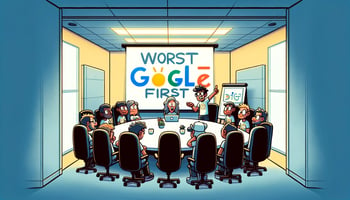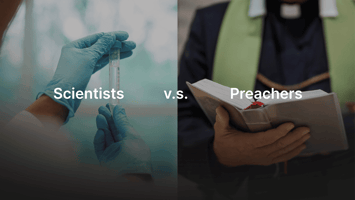When you hear Google, you might imagine geniuses rolling up their sleeves and saying "let's make...
How do Kindergartners beat Business School Students, Lawyers and CEOs?
 Researchers at Stanford University conducted a creative problem solving experiment where teams of 4 had to build the tallest structure they could using common household items. Through dozens of trials, the kindergartners built structures on average of 26 inches vs business school students with 10 inches. They also tested lawyers (15 inches) and CEOs (22 inches). What is going on here?
Researchers at Stanford University conducted a creative problem solving experiment where teams of 4 had to build the tallest structure they could using common household items. Through dozens of trials, the kindergartners built structures on average of 26 inches vs business school students with 10 inches. They also tested lawyers (15 inches) and CEOs (22 inches). What is going on here?
The business school students approached the problem by examining materials, suggesting ideas, and asking savvy questions. They ultimately decided on a strategy, divvied up tasks and started building their structure.
Whereas the kindergartners had no strategic discussion. They abruptly grabbed materials and started building with no plan. They spoke in short bursts like “here!” “no - here!”.
The business school students fail because they are too busy with status management instead of true collaboration. They are subtly working out questions such as:
-
Who is in charge?
-
Is it OK to criticize someone else’s idea?
-
What are the rules?
Navigating this uncertainty around each other led to inefficiency, hesitation, and subtle competition. Which meant that they didn’t grasp the essence of problem and then they ran run out of time.
Meanwhile, the kindergartners are not competing for status. They move quickly, spotting problems, and offering help. They experiment, take risks, notice outcomes, and adjust. They are tapping into a powerful method where ordinary people create performances far beyond the sum of their parts.
This story is directly from the excellent book The Culture Code by Daniel Coyle - which reveals the secrets of the most innovative organizations. At work, we spend lots of time navigating inefficiencies. How can we embody the success of the kindergartners?
One thing you can try this week: the next time your team has an hour to discuss an important project, try jumping into a shared doc or deck and just making "bad" or "rough" versions right in the moment. If you're on Zoom, you can even play music while people work. You'll make progress faster, and surface the true issues that need quick discussion, rather than spending too much time working in hypotheticals.

%202.jpeg?width=50&name=devin-headshot%20(1)%202.jpeg)


